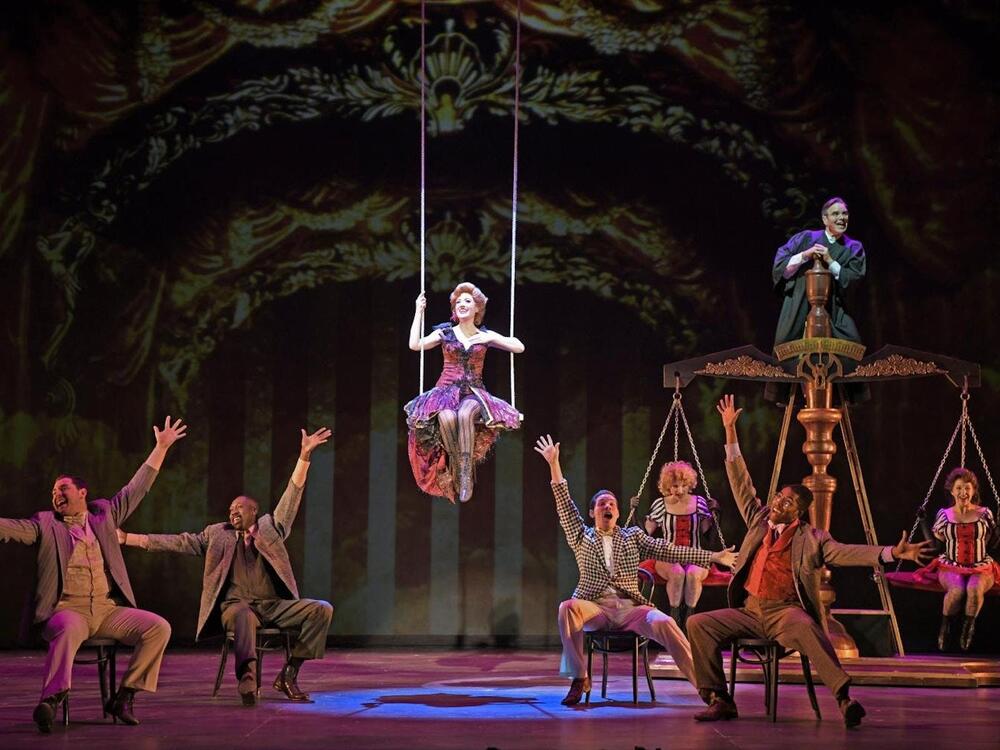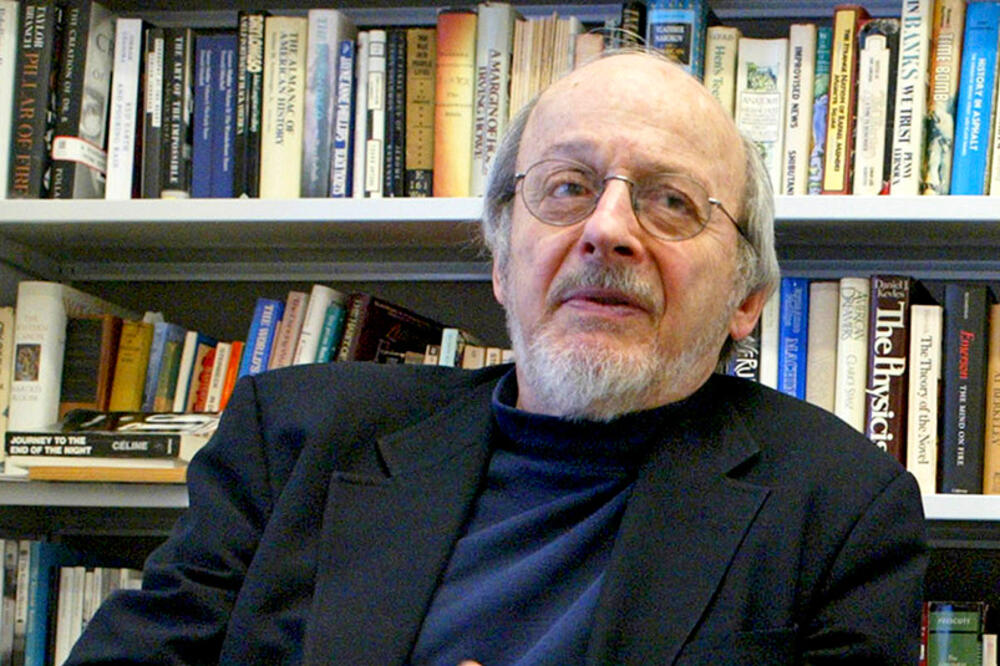The imaginary segment of the biography of JP Morgan, in one of the numerous narrative lines of the novel Ragtime by Edgar Lawrence Doktorov, opened a lively controversy at one time about the ways and permissible levels of fictitious superstructures of the biographies of real personalities. Doctorov will respond to this dust-up in his own manner - humorously, ironically, but also educationally, saying: "I am satisfied that everything I made up about Morgan and Ford is true. Maybe it's truer because it didn't happen."
With these words, the famous writer confirmed what should be known, since it is a procedure that has been present in literature since Aeschylus' Persians, and that is that many writers try to reach some more unfathomable truths than the factual ones by building on the documented with the fictional. These constructions in postmodern literature took on more eccentric forms, so many historical figures often found themselves in bizarre pseudo-biographical situations, like Pynchon, for example. Admittedly, typical postmodernists rather tried to question every truth with innovative procedures, but the absence of any stable truth also emerged as a kind of super-truth in one period. But let's stay in the context of Doktorov's intrigue, which does not call for epistemic relativism. More precisely, the writer of Ragtime tells us in an ironic defense of his novel that some truer truths cannot be reached only through knowledge and speculation, but that for them it is necessary to enter the immanent field of imagination in literature. In this field, almost anything is possible and permissible, and the branched literary and theoretical thought of the last century defined and systematized most of that "everything" into a wide register of procedures such as, among others, the fictionalization or fictionalization of history, pseudo-documentary and various re-creations of real events and biographies often borrowed from the time in which the work was created. The novel is a particularly amenable literary form for these kinds of procedural experiments, which made it the medium that most interactively communicates what is, or has been, with what it can be. Or, as Linda Hutchinson puts it: "A novel is a referential writing and an imaginative invention of the world."
An entire gallery of characters in Ragtime was transferred from reality, it consists of an unusual selection of famous people from the beginning of the XNUMXth century, whose real and fictional episodes from the life of the Doctor, in a kind of kaleidoscopic procedure, revolve around the fictional Wasp family, which owns a factory for the production of flags and fireworks. That combinatorics between low and high mimesis produces striking images of the epoch from which its key neuralgias break through, among which, as the story progresses, the racist one will stand out more and more clearly. Connecting numerous narrative lines in a sometimes not overly motivated way, Doktorov will go much further than racism, shifting the focus to the relationship between individual freedom and a power system whose ambitions are not exhausted in its material or practical achievements.
Doktorov deconstructs that ambition, which was dislodged from rational frameworks, precisely through the construction of some events in the narrative line that follows JP Morgan. In it, the writer reaches for a broader register of the grotesque, behind which diabolical forms of progress can be seen. The story of Morgan's obscenity plan begins with a dinner at his residence on Madison Avenue, hosted for twelve of America's richest men. By creating a kind of corporate Olympus, the financial mogul intends to create a somewhat supernatural situation, which would create an atmosphere for further elaboration of his mysterious plan. The writer's irony follows this idea from its beginning: "He hoped that the walls of his house would burst from the accumulated strength of their minds." In the continuation of the description of the atmosphere of this gathering, the irony sharpens to sarcasm, which captures some of the typical symptoms of the then, essentially everyday, class of hunters - boredom, complacency, self-indulgence, decadence: "Rockefeller surprised him with the information that he was chronically closed and that he thought a lot about the toilet. Carnegie dozed over his glass of cognac. Harriman was grinding nonsense. Gathered in that hall, the business elite had nothing to say. How he abhorred them! ... He ordered the servants to crown all the heads and scalps with laurels. The twelve most powerful men in America all looked like horse asses without exception. But since their wealth earned them the right to pomp, they believed that these ridiculous insults might have some meaning. Neither of their wives thought to laugh. They were just babuskaras. They sat on their broad, draped buttocks, their breasts hanging below their cleavage.”
And what did Morgan want to achieve, or rather - to achieve, in this Doctor's construction? During a visit to the Egyptian pyramids, that rich, jaded old man will be intrigued by the local guide's story about the wisdom revealed to the great Osiris "according to which there is a sacred tribe of heroes, a colony of gods who are regularly born in every age to help mankind". That story will fall like the long-awaited rain on the withered life motives of the creator of a scattered empire, in whose material spectacularity he no longer saw anything exciting. Having reached the earthly limits of power, Morgan will find in the story of the chosen saviors what will act as a springboard with which he will jump those limits.
The dullness of the rich ruminants he collected at dinner will make him abandon the presentation of his revolutionary idea, he will choose only Ford. Although he considered himself to be "an overgrown provincial, uncouth as a log", he saw in Ford's use of people a reincarnation of pharaohism. Already deeply immersed in conspiratorial history and fascinated by ancient Egypt, Morgan began to load the meanings that supported his grandiose plan. Thus, studying Ford's appearance in photographs, he will notice "an unusual resemblance between him and Seti I, the father of the great Ramses." However, during their new meeting in the extravagant building of Morgan's library, where he will present the guest with some ancient writings that have not been shown to anyone until then, Ford will disappoint him with his pragmatic down-to-earthness and leave him alone to wait for the messengers of Osiris.
In the narrative line of the novel, which will occupy a central place in its second part, the fate of the ragtime pianist Koolhaus Walker is followed, a fictional character whose kinship with von Kleist's hero Michael Koolhaas is more than recognizable. When this proud and self-confident black man - who with his behavior and appearance drastically, and one would say strategically, violates the expected inferiority of his race from white America - is intercepted on the road by a group of racist Irish firefighters, humiliate him and destroy his fancy car, it will begin to an escalating drama is unfolding that will turn from personal revenge into impeccably organized terrorist actions. Thus, Walker becomes the charismatic leader of a small group loyal to him to the end, whose struggle will culminate in an invasion of the Morgan library building, where they will barricade themselves and plant explosives of great destructive power. The fulfillment of his demands, which still seem to be of a personal nature, Walker will seek from the position of a potential destroyer of a topos of general importance, created by a man from the top of the social hierarchy in which the rules can still be created based on the personal expectations of a powerful person. , even when he's just an alley-oop racist.
In particular, it should be emphasized that Kolhaus Walker and his team will not possess any of what Morgan used to make his enormous profits, but what was the treasure of his whim - the emblematic space of Morgan's library, in whose secret niches conspiratorial relics were kept. It was a kind of Wevelsburg in which the powerful finds vent to his obscenity, whose ambition goes beyond the earthly department of the corresponding division. With Koolhaus' occupation of Morgan's library, the racial conflict ceases to be valid, with that act the context changes and expands, more precisely - it becomes unimportant that Koolhaus is black, because from the possession of that already symbolic and ideologized topos, he defends elementary human dignity, devoid of racial but not class signs .
Let's look at the socio-economic picture of the modern world, thanks to the spread of the laissez-faire concept and neoliberalism, it is increasingly simplified, adhering to the most simplified class model - the division into rich and poor, with a tendency to deepen the gap between them. According to the latest data from the non-profit organization Oxfam, which is focused on reducing poverty in the world, there have never been more billionaires and never more extreme poor. Some statistics of this organization are devastating indicators of modern progress: 2153 billionaires, as many as there are now in the world, own more money than 4,6 billion people, which is 60% of the world's population; The 1% of the rich have twice as much money as 6,9 billion people, and only 22 rich people have more than the entire female population of Africa. In Ragtime, we see how a large concentration of power and wealth can inspire a billionaire capitalist to "upgrade" his status, still determined by the pragmatic laws of the market and profit, to a higher level of power where ambitions exceed practical, therefore rational motives. That constructed idea about those chosen for a higher mission, inserted into the biography of a powerful man prone to whims, seems more provocative today than at the time of the creation of this novel. After every published Forbes list in recent years, one can rightly ask whether the constant increase in the financial power of those ranked is still conditioned by their practical enthusiasm. In order to avoid confusion, Doktorov's constructions are devoid of those loadings that can slip into paranoia or into one of the branching branches of conspiracy theory. He skilfully demystifies that narrative, because in Ragtime the grotesque face of oppressive power appears, which seems more comical than worrying. What is worrying is not Morgan's imagination, but the fact that morgans are a legal and legitimate phenomenon in the last century and a half, a time of invention and constant improvement of legal and political mechanisms that would enable the creation of a fairer society. Seen from today's perspective, that problem is revealed in the picture of the world, which shows us that despite the thousand-year effort of humanity to reduce social differences, we have Oxfam's statistics as we have them. We can only guess what will come out of it, but what is certain is that in such conditions, obsena also has its chance. Ragtime deals with it as an easily possible extension of excessive power, and that level of power, as experience says, is reached either with money or with ideology. A particularly problematic causality, also proven empirically, is revealed in the fact that shows us that in order to cross the border of practical power, some totalitarian ideological concept is always needed, because only at that level can the power be fully disempowered, which is necessary in order to realize the idea of selection.
In recent history, humanity has experienced two totalitarianisms in which the level of power of their creators exceeded the previously known forms of rule by terror and the reduction of freedom, and in whose ambitions, as time passed, obscenity increasingly penetrated. Although fascism was not achieved by class struggle but by militarism, in its final direction the intention to reach the level from which that power would act from some, conditionally speaking, superhuman class sphere, can be seen through the concentration of total power.
Totalitarianism is an irrational extreme of power, in which those who possess it experience life as their own creation. In such a system, it is not permissible to get out of the given patterns - from the holders of power expected, just as in their provincial atar the white firefighters did not allow Kolhaus Walker to be a polished black man with a good suit and a fancy car. That's why that event on the suburban road is much more than a racist incident, its symbolic atmosphere reveals the most dangerous ambition of power that is omnipresent in all totalitarianism, namely that an individual can only exist within a given framework that does not even have to bring that power any material benefit. Let's not forget, Kolhaus Walker was not robbed, he was not stopped by highway robbers, but by the self-proclaimed masters of a microcosm in which the individual must conform to the expectations of those masters. In that microcosm, his skin color was a signifier for eternal belonging to the subordinates, which can only be justified in a completely irrational world. In this case, such a world consisted of a piece of road and its environment, in the XNUMXth century such a world almost did not become the whole world. Many cases in Stalin's purges were characterized as completely irrational, and therefore inexplicable, because the fact that at that moment Stalin's power greatly exceeded practical ambitions was ignored. This is the same level of power from which the occult-obsessed Himmler mapped out the peacetime future of the Reich.

Yes, Ragtime is very much a novel about fascism, about an irrational and obscene feeling of supremacy. And what is even more important, it is a novel that shows us that fascism lurks just as much in the head of the little man as it does in the heads of big men. It is also a novel about the struggle for dignity, but also for freedom that seeks its totality - it is no accident that he is walking around with Emma Goldman's novel. By the way, the uncompromisingly idealized freedom of anarchism often led its advocates into obscenity. Kollhaus's actions, regardless of the fact that they were not driven by ideals but by spite, irresistibly resemble the actions of some anarchists whose extremism on the question of the non-subordination of personal freedom to any socially proclaimed value showed a great deal of irrationality. Nevertheless, is Kolhaus Walker also some kind of obscenity or is his extremism shown as the last response of the humiliated to the dehumanized motives of the exploiters, those who have been irrevocably moved by financial power into the sphere of whims? That question, as well as many others that open this novel, make it especially relevant today, because the current social stratification and the political bizarreness that accompany it demand, one would say more than ever, new approaches in the interpretation of contemporary manifestations of power. All the more so since Ragtime is, among other things, a story about a world that is beginning to disintegrate from its painstakingly built enlightened foundations, and even from monotheistic ones - a world that is once again bewitched by leaving life to the whims and urges of those skilled in hijacking and grabbing.
All those layers could hardly be revealed in this novel if Doktorov had been more conventional in his treatment of historical facts and more "decent" towards his characters-personalities. Thanks to the pseudo-biographical constructions and the fictional superstructure of real events, Ragtime was shaped into a work of fiction that convincingly confirms the power of fiction in revealing some truer truths, those that lie behind facts, information, experiences or documents.
In the last sentence of the novel, the Doctor once again brings to the stage the eccentric, violent and hackneyed Harry Kendall Thaw: "And Harry K. Thaw managed to get out of the mental hospital and every year he marched in Newport in the Victory Day parade." With this move, is Doktorov letting the genie out of the bottle, who, although not quite himself, loves patriotic celebrations. Why, out of a whole gallery of real people, did Doktorov give To the "privilege" to close Ragtime? By the way, from the end of the first third of the novel, he does not appear until that last sentence. How much of the Doctor of this jovial and violent tycoon, who does not like blacks and has as his wife a representative of the category of girls who could be called the great-grandmothers of starlets, does he leave us as a model of a desirable parader of a coming age? And of course, that system does not have to be established by any inspired powerful in their treasure troves of conspiratorial relics, it can be created by the perpetuated mechanisms of once again rampant capitalism, the one driven by an equally rampant ego fed by the ever expanding laissez-faire concept of contemporary social progress.
And finally, why did the racial problem in the current American protests take on a class character so quickly? To what extent did the tragic event on the Minneapolis road trigger the anger not only of Floyd's brothers by skin color, but also of all those whose skin is torn by the arrogant financial elite? That this is so, is also shown by Donald Trump's panicked intention to ban Antifa, calling it a terrorist organization. It not only brings back memories of McCarthy's blacklists, but also the more terrible bans of leftists in the XNUMXs in Germany and even more blacklists that followed. Yes, that's how the ruler reacts when he overcomes his more or less rational ambitions, when he doesn't even think of working on creating a more just society, but announces with the Bible in hand: "I'm sending thousands and thousands of armed soldiers". not even thinking about what, if anything, genre outburst he made with such a performance.
Bonus video:





